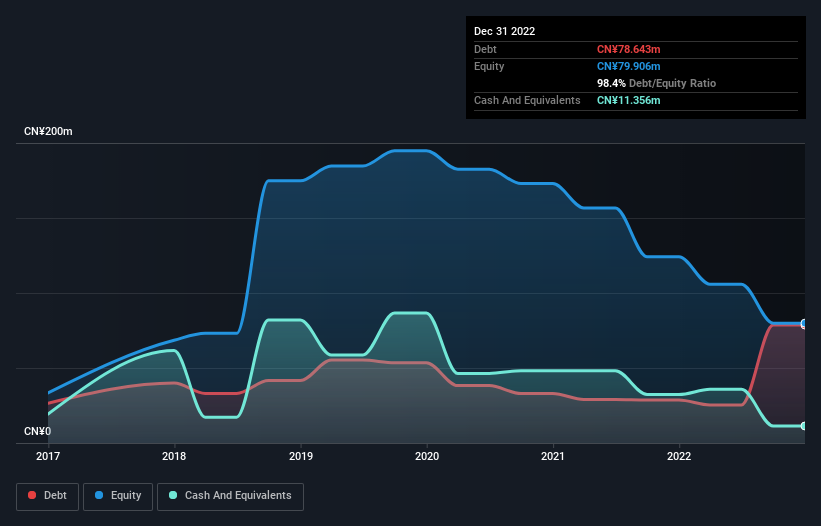- Hong Kong
- /
- Consumer Durables
- /
- SEHK:1715
Miji International Holdings (HKG:1715) Is Making Moderate Use Of Debt
David Iben put it well when he said, 'Volatility is not a risk we care about. What we care about is avoiding the permanent loss of capital.' So it might be obvious that you need to consider debt, when you think about how risky any given stock is, because too much debt can sink a company. We note that Miji International Holdings Limited (HKG:1715) does have debt on its balance sheet. But should shareholders be worried about its use of debt?
When Is Debt Dangerous?
Generally speaking, debt only becomes a real problem when a company can't easily pay it off, either by raising capital or with its own cash flow. If things get really bad, the lenders can take control of the business. However, a more common (but still painful) scenario is that it has to raise new equity capital at a low price, thus permanently diluting shareholders. Having said that, the most common situation is where a company manages its debt reasonably well - and to its own advantage. When we examine debt levels, we first consider both cash and debt levels, together.
Check out our latest analysis for Miji International Holdings
What Is Miji International Holdings's Debt?
The image below, which you can click on for greater detail, shows that at December 2022 Miji International Holdings had debt of CN¥78.6m, up from CN¥28.7m in one year. However, it also had CN¥11.4m in cash, and so its net debt is CN¥67.3m.

A Look At Miji International Holdings' Liabilities
We can see from the most recent balance sheet that Miji International Holdings had liabilities of CN¥109.2m falling due within a year, and liabilities of CN¥4.71m due beyond that. Offsetting these obligations, it had cash of CN¥11.4m as well as receivables valued at CN¥71.6m due within 12 months. So it has liabilities totalling CN¥30.9m more than its cash and near-term receivables, combined.
While this might seem like a lot, it is not so bad since Miji International Holdings has a market capitalization of CN¥131.5m, and so it could probably strengthen its balance sheet by raising capital if it needed to. But we definitely want to keep our eyes open to indications that its debt is bringing too much risk. When analysing debt levels, the balance sheet is the obvious place to start. But you can't view debt in total isolation; since Miji International Holdings will need earnings to service that debt. So when considering debt, it's definitely worth looking at the earnings trend. Click here for an interactive snapshot.
Over 12 months, Miji International Holdings made a loss at the EBIT level, and saw its revenue drop to CN¥88m, which is a fall of 39%. To be frank that doesn't bode well.
Caveat Emptor
Not only did Miji International Holdings's revenue slip over the last twelve months, but it also produced negative earnings before interest and tax (EBIT). Indeed, it lost a very considerable CN¥41m at the EBIT level. Considering that alongside the liabilities mentioned above does not give us much confidence that company should be using so much debt. So we think its balance sheet is a little strained, though not beyond repair. For example, we would not want to see a repeat of last year's loss of CN¥43m. So to be blunt we do think it is risky. The balance sheet is clearly the area to focus on when you are analysing debt. However, not all investment risk resides within the balance sheet - far from it. Be aware that Miji International Holdings is showing 3 warning signs in our investment analysis , and 2 of those can't be ignored...
When all is said and done, sometimes its easier to focus on companies that don't even need debt. Readers can access a list of growth stocks with zero net debt 100% free, right now.
New: Manage All Your Stock Portfolios in One Place
We've created the ultimate portfolio companion for stock investors, and it's free.
• Connect an unlimited number of Portfolios and see your total in one currency
• Be alerted to new Warning Signs or Risks via email or mobile
• Track the Fair Value of your stocks
Have feedback on this article? Concerned about the content? Get in touch with us directly. Alternatively, email editorial-team (at) simplywallst.com.
This article by Simply Wall St is general in nature. We provide commentary based on historical data and analyst forecasts only using an unbiased methodology and our articles are not intended to be financial advice. It does not constitute a recommendation to buy or sell any stock, and does not take account of your objectives, or your financial situation. We aim to bring you long-term focused analysis driven by fundamental data. Note that our analysis may not factor in the latest price-sensitive company announcements or qualitative material. Simply Wall St has no position in any stocks mentioned.
About SEHK:1715
AI Health Technology
An investment holding company, engages in the research and development, manufacturing, and trading of kitchen appliances primarily in the People’s Republic of China.
Excellent balance sheet with slight risk.
Market Insights
Community Narratives



